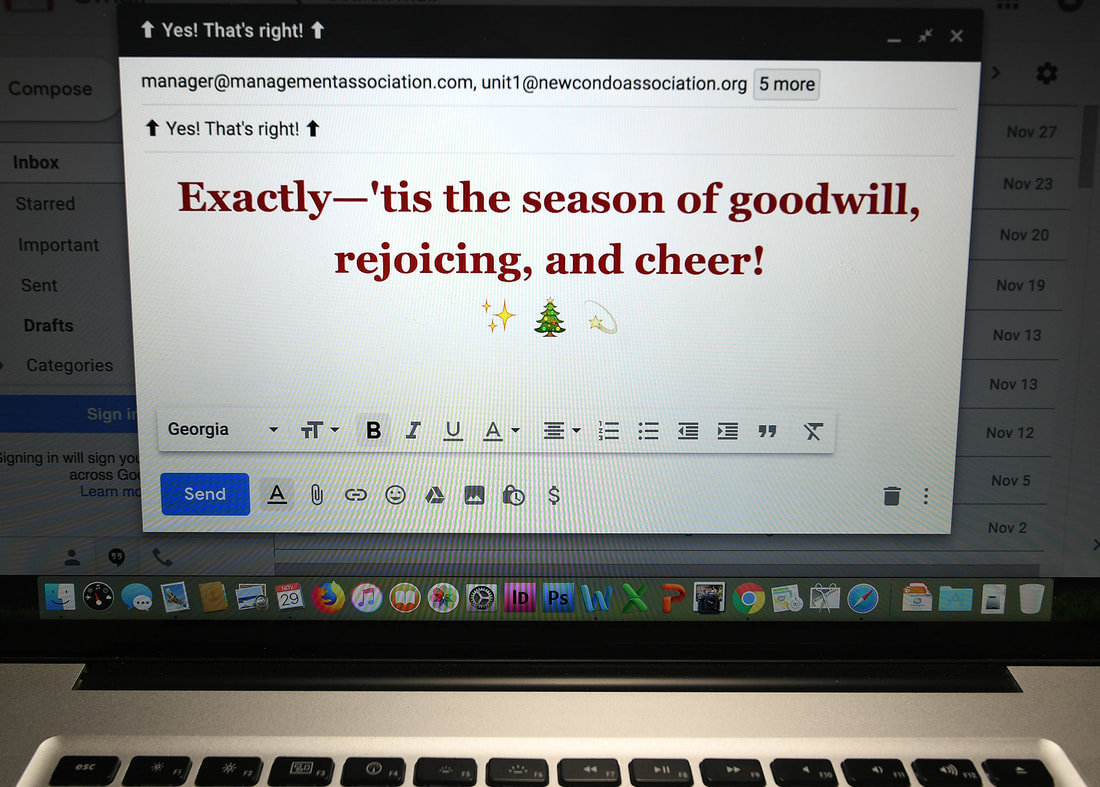The other day, I heard about a new condo association that had recently emerged in a multi-unit house in the neighborhood. When I probed about any contractor opportunities connected to this association, I learned they had hired a professional condo manager to oversee all that. Then it turned out the real news was about trouble in paradise…
Some of the condo-association trustees apparently weren’t happy with the cleaning crew and with the way the condo manager was dealing with contractors overall. One trustee then vented liberally in a pointed e-mail to the manager—with all other trustees CC’d on it:
Some of the condo-association trustees apparently weren’t happy with the cleaning crew and with the way the condo manager was dealing with contractors overall. One trustee then vented liberally in a pointed e-mail to the manager—with all other trustees CC’d on it:
Umm…okay, the e-mail was so sharp, I chose not to show it. (But the photo made you look!)
The gist of the e-mail was that the honesty and priceworthiness of the cleaning crew was questioned, as was the manager’s competency in supervision and financial oversight.
Perception is not reality.
While some trustees did have questions, all were not on the same page even about the scope of the issue. That e-mail presented “facts” that really came down to observations interpreted in certain ways. Nevertheless, those “facts” were followed by hastily drawn conclusions, not to mention salvos of finger pointing.
Substandard communication puts all team members on the spot.
Functionally, a condo association is a team. In the case of this team, its “forming” was not long ago. Meaning, the team is now probably going through its “storming” stage. And yet, one trustee (i.e., team member) chose to speak for everyone—prematurely, in more than one way.
Now the entire condo association is left with the fallout, which is at least two-pronged: one, they have to scramble for common ground in assessing the issue; and two, there will be some fence mending needed, since the manager is not exactly thrilled with the slew of accusations directed at their own practices and at the contractors they work with. And again, it doesn’t help that all trustees are not on the same page as to what the problem really is all about.
For starters, I hear the author of that e-mail has since apologized.
In baseball, it is called an “unforced error” for a reason.
It didn’t have to come down to this situation. Whether any of the work by (or the dealings between) the condo manager and the cleaning crew was dysfunctional remains to be seen. Do I need to point out there are more adaptive ways of identifying concerns, and more professionally obliging ways of discussing them?
Perhaps this is a good time of the year to remember some of the benevolent notions, including the acknowledgement of ambiguity, giving the benefit of the doubt, and articulating needs. Come on—the season of goodwill, rejoicing, and cheer is just kicking into high gear!
The gist of the e-mail was that the honesty and priceworthiness of the cleaning crew was questioned, as was the manager’s competency in supervision and financial oversight.
Perception is not reality.
While some trustees did have questions, all were not on the same page even about the scope of the issue. That e-mail presented “facts” that really came down to observations interpreted in certain ways. Nevertheless, those “facts” were followed by hastily drawn conclusions, not to mention salvos of finger pointing.
Substandard communication puts all team members on the spot.
Functionally, a condo association is a team. In the case of this team, its “forming” was not long ago. Meaning, the team is now probably going through its “storming” stage. And yet, one trustee (i.e., team member) chose to speak for everyone—prematurely, in more than one way.
Now the entire condo association is left with the fallout, which is at least two-pronged: one, they have to scramble for common ground in assessing the issue; and two, there will be some fence mending needed, since the manager is not exactly thrilled with the slew of accusations directed at their own practices and at the contractors they work with. And again, it doesn’t help that all trustees are not on the same page as to what the problem really is all about.
For starters, I hear the author of that e-mail has since apologized.
In baseball, it is called an “unforced error” for a reason.
It didn’t have to come down to this situation. Whether any of the work by (or the dealings between) the condo manager and the cleaning crew was dysfunctional remains to be seen. Do I need to point out there are more adaptive ways of identifying concerns, and more professionally obliging ways of discussing them?
Perhaps this is a good time of the year to remember some of the benevolent notions, including the acknowledgement of ambiguity, giving the benefit of the doubt, and articulating needs. Come on—the season of goodwill, rejoicing, and cheer is just kicking into high gear!

